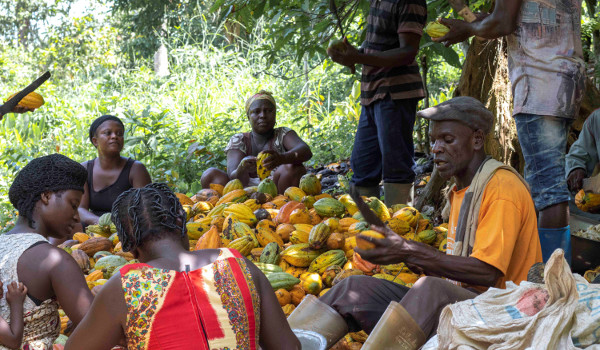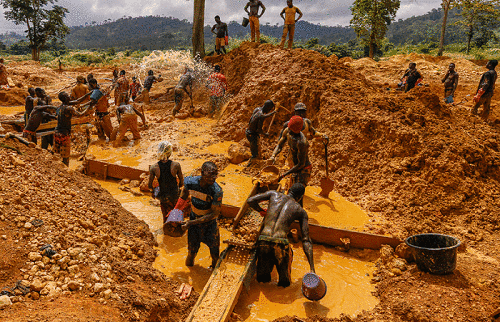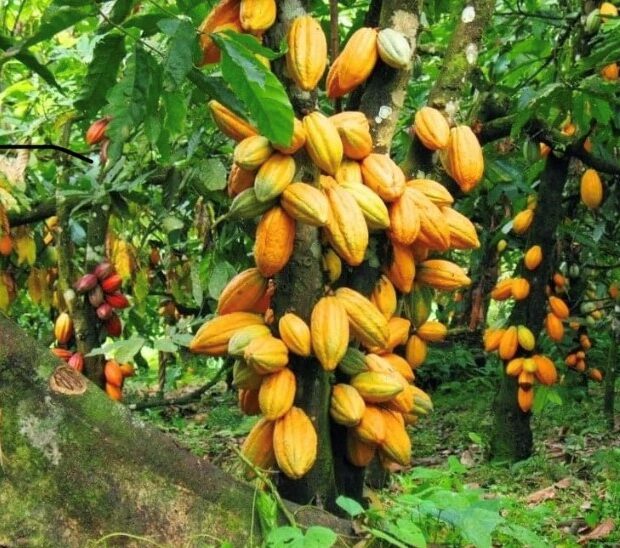Cocoa has been a major foreign earner for Ghana for over a century. Indeed, cocoa production has been the backbone of Ghana’s economy since the 1870s. Even though the agriculture sector employs the majority of Ghanaians, the cocoa subsector employs about 800,000 farmers – directly benefitting many households.
One major benefit of the cocoa sector is that it supports the livelihoods of others in the commerce, service and industrial sectors of the Ghanaian economy. This makes it an important generator of revenue.
According to the Ghana Cocoa Board, records indicate that Dutch missionaries planted cocoa in the coastal areas of the then Gold Coast as early as 1815; while in 1857 Basel missionaries also planted cocoa at Aburi. However, these did not result in the spread of cocoa cultivation until Tetteh Quarshie, a native of Osu, Accra – who had travelled to Fernando Po and worked there as a blacksmith, returned in 1879 with Amelonado cocoa pods and established a farm at Akwapim Mampong in the Eastern Region.
The literature continues that farmers bought pods from his farm to plant and cultivation spread from the Akwapim area to other parts of the Eastern Region. In recognition of the contribution of cocoa to the development of Ghana, government in 1947 established the Ghana Cocoa Board (COCOBOD) as the main government agency responsible for development of the industry.
Cocoa’s contribution to independence struggles
Some historians have drawn some links to Ghana’s struggle for independence to the role cocoa farmers played. For example, the struggle for independence has been linked to the mid-1930s when cocoa farmers refused to sell cocoa beans to European merchants due to exploitation. It is important to point out that the farmers who produced the cocoa, the brokers that served as middlemen, and chiefs who often also served as producers and brokers all participated in the resistance.
The holdup of cocoa beans in those years extended throughout the then Eastern Province, Ashanti, part of the Central Province…and even some limited holdups in Nigeria. This move resulted in the colonial authorities, particularly Governor Sir Arnold Hodson, creating a Cocoa Marketing Board that in itself did little to change the underlying problems. Later in the struggle, cocoa farmers and all the stakeholders played major roles, both commercially and physically, to propel the achievement of Ghana’s independence.
In observing Ghana’s 64th Independence, the contribution of cocoa to Ghana’s economy cannot be overemphasized – particularly the enviable recognition that Ghana has gained as the country that produces the best quality cocoa and the most authentic chocolate. Of course, Tetteh Quarshie has been celebrated over the years for introducing and sustaining the plant in Ghana.
Impacting livelihoods of cocoa farmers
In 2020, COCOBOD signed a US$1.3billion cocoa syndicated loan to help produce cocoa beans for the 2020/2021 crop season. One significant development that occurred in the cocoa sector was when Ghana and Ivory Coast pushed for a rise in price of the commodity to implement a price floor of US$2,600 per tonne and a Living Income Differential (LID) of US$400 per tonne, meant to tackle poverty among farmers.

This initiative has been lauded by many stakeholders who say the move will help ameliorate challenges of the most important group in the production line – the farmer.
Boosting local consumption of cocoa products
Even though Ghana and Ivory Coast account for over 60% of global cocoa-bean production, the two countries earn less than 3 percent of the over-US$60billion cocoa industry. A lot of factors account for this.
First, the consumption of cocoa products in Ghana is generally low. In fact, Ghana imports more synthetic chocolate from the East and consumes same compared to consumption of authentic chocolate made from cocoa in Ghana. The few cocoa processing companies that operate in the Ghana Free Zones enclave export their produce. To benefit from cocoa and be a significant player in the value chain, Ghanaians must consume cocoa products. Its medicinal and health benefits alone should encourage all to make cocoa product consumption a daily process.
It was therefore particularly exciting, and generally encouraging, when the Chief Executive of Ghana COCOBOD, Joseph Boahen Aidoo, led a campaign in February this year to launch the 2021 National Chocolate Week. Among others, the Chief Executive has called for the consumption of cocoa drinks in schools – especially at the basic level – to inculcate the habit in the young.
Oftentimes, he has personally stressed at events that “We are going for a cocoa break” in direct opposition to the usual “We are going for a coffee break” mantra. For a country that is 64-years old and owes its economic development to the cocoa sector, consuming cocoa products should not just be seen as an obligation but an act of nationalism that will benefit the cocoa farmer.
The role of Ghana in a changing global market
In their research work titled ‘Cocoa in Ghana: Shaping the Success of an Economy’, Shashi Kolavalli and Marcella Vigneri argued that Ghana is well-positioned to expand its position in high value markets, with Cocobod proving to be responsive to trends in international markets.
The chocolate industry has also expanded into secondary markets, such as fair trade. Although these markets offer strategic opportunities for countries to build competitiveness, estimated in 2000 at 2.6 percent of world cocoa bean trade (Abbott 2002), the authors maintained that they largely remain niche-markets because of their limited capacity for expansion.
Ghana’s considerable progress in the fair-trade cocoa market began with the establishment in 1993 of Kuapa Kokoo – a farmers’ cooperative that operates as a private, licenced buying company. Its share in the domestic market is now estimated to be around 10 percent of total purchases, and a panel survey of farmers spanning 2002 to 2006 shows the cooperative to be farmers’ second preferred outlet for selling beans. Within Cocobod, a special channel exists for fair-trade cocoa sourced and exported from Kuapa Kokoo.
Threat of ‘Galamsey’ to cocoa production
A comprehensive report conducted by the National Geographic on 6th March 2018 showed that environmental degradation as a result of illegal mining, popularly called ‘galamsey’, is the single most dangerous threat to survival of the cocoa industry in Ghana. The invasion of Chinese miners who use unauthorised means to mine gold and destroy the land is devastating. More grievously, these Chinese are offering mouth-watering cash for cocoa farmers to sell their cocoa farms which are destroyed for mining.

A farmer by name Kwaku Asare of Denkyira Asikuma told the National Geographic that: “When the Chinese came, they told me that my plants were not yielding anymore because there was so much gold under the soil,” he said. The story continues that after a few years of low production, he sold his 14-acre cocoa farm to a group of small-scale gold miners, also called galamsey miners, with a Chinese sponsor. According to Asare, the money is gone now and the land is poisoned.
The report uncovered that Kwaku Asare’s story is not uncommon in Denkyira Asikuma, a small farming village nestled among cocoa plantations outside Dunkwa in the Central region.
At least 30 cocoa farmers in the village have sold their land to miners – who quickly excavated, pumped in water and chemicals, and abandoned their pits when the work was done or when soldiers chased them away.
This story is not different from what has been reported in the local media about the devastating effect of galamsey on the cocoa industry. What the authorities in Ghana have to note is that the industry serves over 700,000 farmers and directly impacts the lives of millions in the country. The amount of foreign earnings made from the crop cannot to ignored. One can only imagine the level of poverty that will befall all the people in the value chain if the cocoa industry is allowed to collapse by the activities of illegal miners who seek their selfish interest today.
Dropping cocoa production in Ghana
In 2011, Ghana hit a record cocoa production level of over one million tonnes. This feat was seen as remarkable and very encouraging, making Ghana the country with the largest premium cocoa. The story has not been the same ever since 2011. As illegal mining increased in cocoa growing areas, the production levels began to fall until the country hit 740,000 tonnes in 2015.
Sadly, COCOBOD has struggled to regain its enviable production level of over one million tonnes. The country has always fallen below its target of 850,000 tonnes. Clearly, the situation is likely to persist as Nana Akufo-Addo’s government is frustrated in its fight against illegal mining. Galamsey is the single most dangerous threat to cocoa production in Ghana. Some have described it as ironic, as two precious commodities – gold and cocoa, which have contributed to Ghana’s economy – are being unwholesomely exploited to destroy not just the environment but livelihoods.
The dangerous use of mercury
More alarming is the usage of mercury on these cocoa farms, causing irreparable damage to the land. This means that any attempt to restore the soil fertility and plant cocoa again is likely to fail. It is not difficult to see yellow holes filled with brackish water at cocoa farms in Ghana. This could even lead to heavy metals being detected in Ghana’s cocoa beans, resulting in a ban.
Conclusion
There have been many literatures on how to salvage the situation as the clock ticks. Indeed, President Akufo-Addo has called for a stakeholder discussion and to have clear plans outlined on how to end galamsey and provide sustainable jobs for those engaged in it – since simply making it illegal is not solving the situation. This is also partially due to the fact that the systems put in place in most cases have been corrupted.
The COCOBOD must lead the fight by engaging farmers and relevant stakeholders such as chiefs to desist from selling cocoa lands to Chinese illegal miners.










